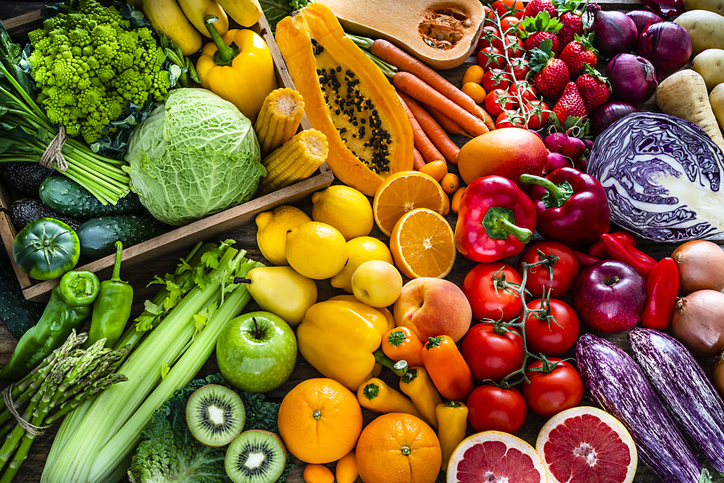 When flu season comes around, we hear of everyone stocking up on vitamin C and multivitamins to “boost” the immune system.In reality, our immune system is strongest when we eat a variety of foods throughout the year. The best way is to always remember to “eat the rainbow.” When we “eat the rainbow” it means we try to eat all of the colors the rainbow has as each color of fruits and vegetables offers a different set of nutrients. Know that healthy eating does not have to be boring. You can use spices and herbs such as turmeric, thyme, pepper and oregano to add flavor. All of these also help with inflammation as they are considered anti-inflammatory foods.
When flu season comes around, we hear of everyone stocking up on vitamin C and multivitamins to “boost” the immune system.In reality, our immune system is strongest when we eat a variety of foods throughout the year. The best way is to always remember to “eat the rainbow.” When we “eat the rainbow” it means we try to eat all of the colors the rainbow has as each color of fruits and vegetables offers a different set of nutrients. Know that healthy eating does not have to be boring. You can use spices and herbs such as turmeric, thyme, pepper and oregano to add flavor. All of these also help with inflammation as they are considered anti-inflammatory foods.
In this article you will find foods that are important to keep you healthy and strong (other than vitamin C). Remember to eat all types of fruits and vegetables and not only eat the foods that are pointed out. This is only to guide you in building a healthy and balanced plate.
Beans, lentils and dark leafy greens for iron!
Iron is an important mineral that plays a role in the transport of oxygen throughout our bodies. When iron in the cells is low this is called iron-deficiency anemia. If iron is low, we are likely to feel tired often andit is difficult for the immune system to fight back. It is always a good idea to add a food with vitamin C to meals with iron rich foods. Vitamin C helps the cells take in iron. You can find vitamin C is not only in oranges and limes but also in bell peppers, broccoli and tomatoes. Did you know a cup of chopped bell peppers has three times more vitamin C than one orange?
Fatty fish, milk and sun for vitamin D!
Another name for vitamin D is “the sunshine vitamin.” This is because when our skin is exposed tosunlight, it makes vitamin D. Just 20 minutes a day can raise your vitamin D levels. Vitamin D is important to keep bones and teeth healthy, but vitamin D does much more than that. This vitamin is present in many of the cells in our bodies and used for different reasons. As you may have guessed it one way the body uses it is to help the immune system work normally. Some studies have found that vitamin D can even help you fight heart disease. Like iron, when levels are low in the body, you may feel tired oran overall sense of not feeling well. Sometimes you may feel bone or muscle pain or weakness.
Green vegetables and nuts for vitamin E!
Have you heard of antioxidants? Antioxidants are used by the body to fight off damage caused by free radicals. Free radicals are formed when the body changes the food we eat into energy or by coming in contact with cigarette smoke, and air pollution. While it may be difficult to stay away from free radicals, vitamin E acts as an antioxidant. The body also uses vitamin Eto fight off bacteria and viruses. While it is not common for people to have low levels of vitamin E, it is important to include it in our diet.
Get enough sleep!
To support our healthy eating habits, it is important to get enough sleep each night. Giving yourbody enough quality sleep helps to protect your mental health, physical health, quality of life andsafety. It is recommended that adults aim for 7 to 8 hours of sleep nightly.
In conclusion, food provides more than just energy and protein.Itgives our bodies the nutrientsneeded to perform our daily activities. By eating at least three different colors daily you aregetting many vitamins and minerals that support the immune system and help you feel great. If itis difficult to remember everything you read today remember these two key points: 1) eat avariety of fruits and vegetables daily and 2) get enough quality sleep. These two points will helpyour immune system feel stronger and keep you healthier in the long run.
References
Ward, R.J.,Crichton, R.R., Taylor, D.L. et al. Iron and the immune system. J Neural Transm.118, 315–328 (2011).https://doi-org.dax.lib.unf.edu/10.1007/s00702-010-0479-3
Moore M. How vitaminC supports a healthy immune system. Academy of Nutrition andDietetics. Published March 22, 2019. Accessed April 21, 2020. https://www.eatright.org/food/vitamins-and-supplements/types-of-vitamins-and-nutrients/how-
vitamin-c-supports-a-healthy-immune-system
Aranow C. Vitamin D and the immune system. J Investig Med. 2011;59(6):881–886.doi:10.2310/JIM.0b013e31821b8755
Klemm S. What is Vitamin D? Academy of Nutrition and Dietetics. Published January 18, 2019.Accessed April 21, 2020.https://www.eatright.org/food/vitamins-and-supplements/types-of-vitamins-and-nutrients/what-is-vitamin-d
Vitamin E. National Institutes of Health. Updated February 28, 2020. Accessed April 22, 2020.
https://ods.od.nih.gov/factsheets/VitaminE-Consumer/
Sleep Deprivation and Deficiency. National Heart, Lung, and Blood Institute. Accessed April 27,2020.https://www.nhlbi.nih.gov/health-topics/sleep-deprivation-and-deficiency
Author: Veruska Gonzalez, Dietetic Intern, Florida Department of HealthApril 27, 2020
 OTHER LANGUAGES
OTHER LANGUAGES
 OTHER LANGUAGES
OTHER LANGUAGES